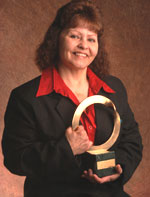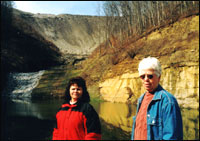The ancient mountains of Appalachia are corrugated with deep, narrow valleys, some of them no wider than a football field. Coal-mining families, who have lived in these valleys for generations, are now being driven out of their homes by the latest innovation of the very industry that has sustained them for so many years. That innovation, mountaintop-removal mining, literally slices off mountain peaks, threatening the valleys below with massive floods, sludge spills, and indiscriminate waste dumping. So far, this brutal form of mining has destroyed more than a thousand miles of streams and rivers.

Julia Bonds.
Photo: Goldman Environmental Prize.
Native West Virginian Julia Bonds understands these problems intimately. In 2001, mountaintop-removal mining forced her and her family to evacuate, leaving behind not only their home but also their history, in the form of the family cemetery. Bonds, 51, is the executive director of Coal River Mountain Watch, where she puts in some 90 hours per week fighting the environmental and social devastation of Appalachia. She’s helped convince the State Mining Board to suspend operations at one polluting mine and better protect valley hamlets from mine blasting. Her group has also teamed up with the United Mine Workers’ Union to fight mining companies’ use of overweight coal trucks. This year, she and her allies plan to hit the road, spreading the word about the hazards of mountaintop-removal mining to the rest of the nation.
Bonds and other mining activists face an uphill battle on the national front. In May 2002, after a U.S. district judge ruled that the federal government was violating its own regulations by permitting mine-waste dumping in streams, the U.S. EPA changed its regulations to allow the practice. Although the judge again ruled that the dumping was illegal, an appeals court overturned his decision in late January of this year.
On April 14, Bonds was awarded one of six 2003 Goldman Environmental Prizes. She plans to use the prize money to further her work — and pay off her new house. She spoke with Grist from her home in Whitesville, W.Va.
Can you describe the effects of mountaintop-removal mining on communities and the environment?
What I’ve seen happening in the coalfields is the total destruction of what God put on Earth to help humans and wildlife, the complete annihilation of the communities and culture of Appalachia. It’s not only turning the mountaintops into wastelands, but the valleys as well. The wonderful and valuable hardwood forests are being destroyed, and they will not return for over 600 years, if ever. Our beautiful mountain streams have been devastated.
Mountaintop-removal mining destroys more jobs than it creates [because of mechanization]. I’ve seen schools close, communities die from the lack of jobs. The blasts from the mine damage homes — people think that houses in Appalachia are substandard, and that may be true, but that’s all some people have — and the air quality where they’re blasting and mining is the worst anyone can imagine.
The worst devastation comes from the flooding, though. You don’t have to be very smart to understand that once you remove soil and vegetation from the top of a very steep mountain valley, you’re going to increase runoff from rain events. We’ve seen extensive flooding in Appalachia, and there’s much more to come — and when disasters occur here, the taxpayers pay for it. It comes out of your pocket. It’s insane, just insane.
I understand you and your family were the last residents to evacuate from your hometown of Marfork Hollow. What happened to the town?
I’m the seventh generation to live in that hollow, and my grandson is the ninth. Massey Coal [Company] moved in there around 1994. Now, I’m used to coal mining — I’m from a coal-mining family — but I was not prepared for what Massey brought down on our heads in Marfork. The reserves they’re mining now are not the clean reserves they were mining in the ’40s, ’50s, and ’60s. These reserves create more waste than coal. The air pollution, the coal dust, is unbearable in that little community. My grandson now has asthma, and my home and my neighbors’ homes were damaged by coal dust.
There were a series of fish kills. The thing that really sticks in my mind is a six-year-old child, my grandson, standing in a stream full of dead fish and asking, “What’s wrong with these fish?” I looked down at the water and screamed. My family, for generations, has enjoyed that stream, but we never went back in the river again. We also witnessed several blackwater spills [of coal waste]. Those are so thick they’re like pea soup, with big black chunks in it. I knew people were going to have to drink that crap.
In Marfork, there’s a huge earthen dam for coal waste — it’s eventually going to be 924 feet tall and will hold 7 billion gallons of waste — that sat three miles above my home. I was sitting out on the front porch with my grandson, and he told me he had picked out an escape route in case the dam failed. I knew in my heart there was really no escape. How do you tell a child that his life is a sacrifice for corporate greed? You can’t tell him that, you don’t tell him that, but of course he understands that now.
 Julia Bonds and Freda Williams, in a devastated West Virginia valley. Photo: Robert F. Gates.
Julia Bonds and Freda Williams, in a devastated West Virginia valley. Photo: Robert F. Gates.
Why did you stay so long — longer than anyone else in town?
That was my home. Living in a hollow in West Virginia is unique. You feel so secure and protected, it’s so peaceful and quiet — until a mining company moves in, of course. They were completely indifferent to the people that lived there. Our family retained a lawyer, and [Massey Coal] agreed to buy our property, so we’ve moved 12 miles above the sludge dam. But there’s still a dam right above my grandson’s elementary school.
What was the first step you took as an activist?
When I saw the fish kill, I called the neighbor that lived above me, and I found out that it wasn’t the first fish kill. The neighbor said, “Here’s the Department of Environmental Protection’s number, call them.” Two weeks later I noticed a flyer on a window that said there was a rally against irresponsible mining. I went to that rally, I went to one meeting, and I never looked back.
When you started your work, were many people you knew speaking out?
There were a few people, a very few people active. As these mines come closer to communities, more people are speaking out. Unless you live in the coalfield counties, you don’t understand the oppression the people live under. This is a mono-economy, and politicians have kept out other industries, so we’ve had to rely on it. If it blasts, oozes, or gushes, it’s done near poor, oppressed, rural communities or minority communities. This is a dirty little secret that people are now speaking out about.
Can you tell me about some of the threats you’ve experienced because of your work?

You really haven’t been intimidated until you see a 60-ton coal truck swerve at you on a narrow road, when there’s a rock cliff on one side and a 100-foot drop-off on the other. I have a friend that says the only difference between now and the 1920s [when coal companies persecuted and even killed union organizers] is that they’re not shooting us on courthouse steps. They’re running us over with coal trucks.
The coal companies pack permit hearings with their men, and they brainwash the men, telling them, “These are the people who are going to take your jobs away.” So there’s foul language, threats, phone calls. You really can’t dwell on it. Once I heard someone say at a permit hearing, “If I were these ladies, I’d be afraid to go home tonight.” Well, you can’t scare Appalachian women, and they ought to know that. We’ve had to fight all our lives.
Do you believe the mining companies can reform their practices?
We’d like for them to mine coal responsibly, but we also want to bring in other industries. We want diverse economic development so that we have something when the coal is gone — and that day is not far away. We need to wean ourselves. Our government knows this, and the alternatives are there, but the political will is missing.
At the same time, we can no longer blame the industry and politicians. It’s our fault, too. We have to get off our duffs, get our noses out of the TV, and get our children to speak up. We really need to push.
What’s been your greatest victory so far?
I think it’s watching or reading when an oppressed Appalachian person stands up with a protest sign, or writes a letter to the editor. When people empower themselves, that’s the greatest victory.


